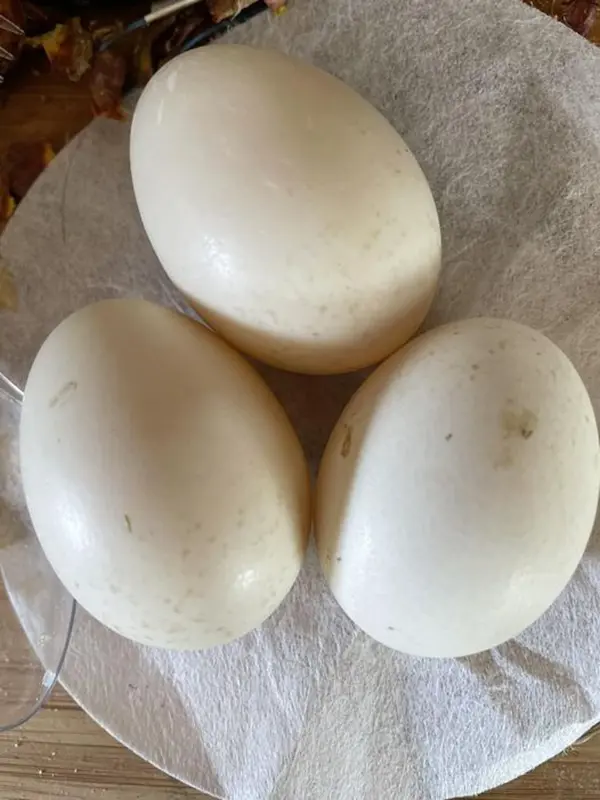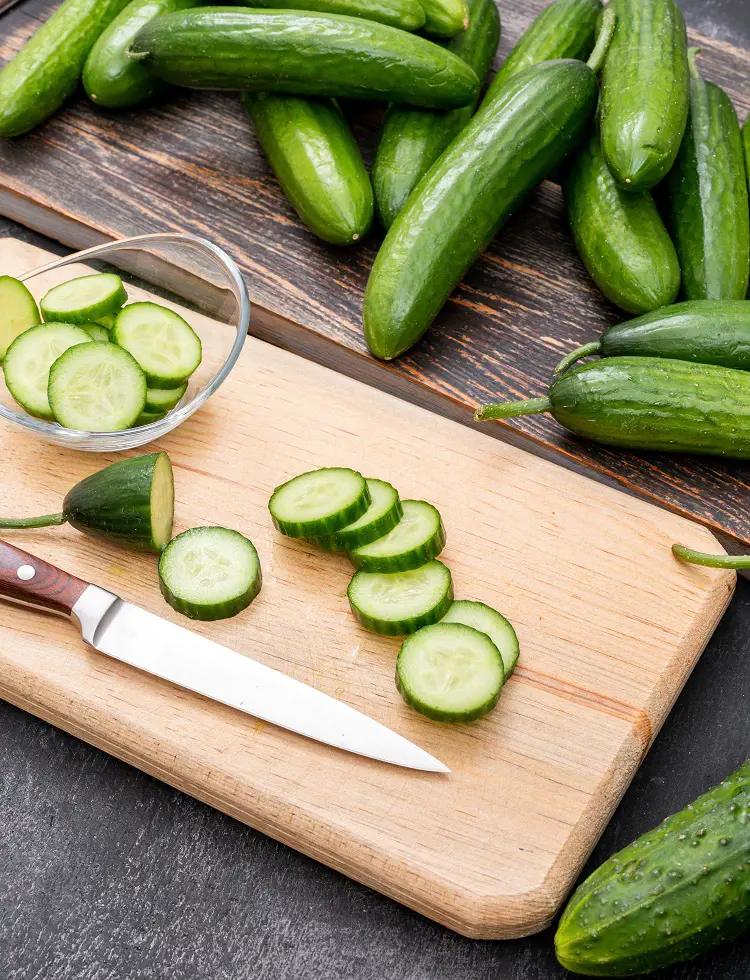Peas Nutritional Benefits You Should Know About
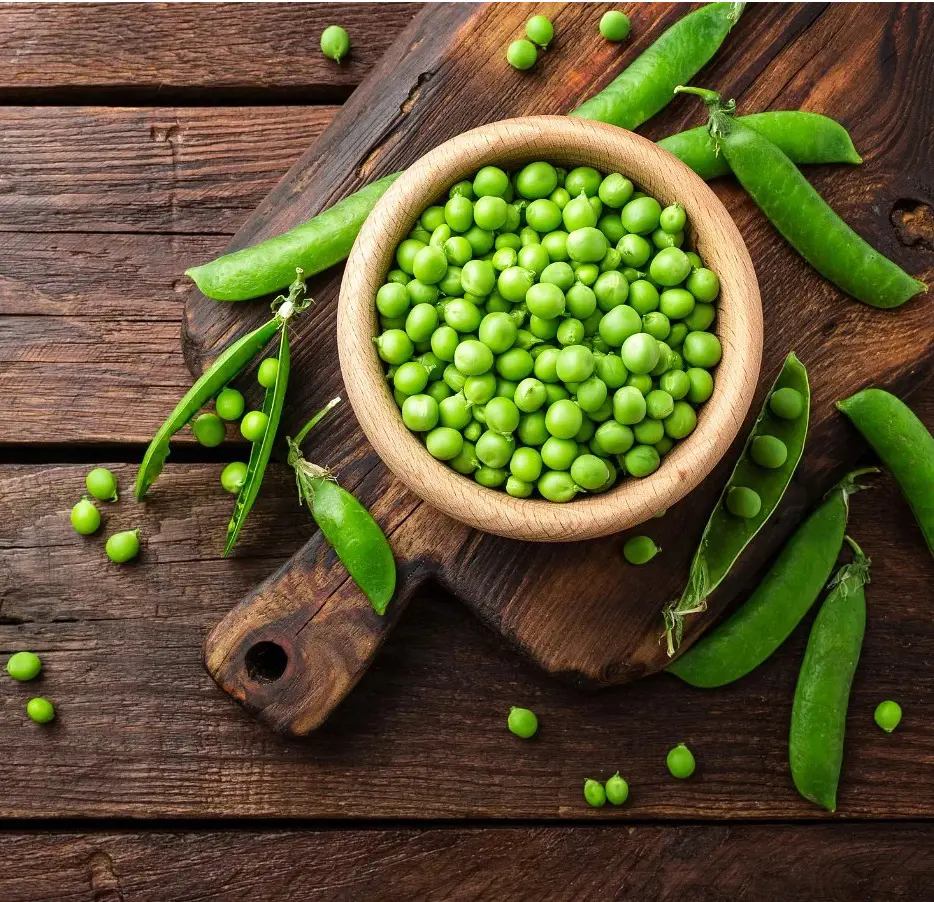
This post may contain affiliate links. If you make a purchase through links on our site, we may earn a commission.
Peas are a popular vegetable that is enjoyed by many people around the world. One of the most surprising facts about peas is that they are quite high in protein. They are also rich in vitamins and minerals, including vitamin C, vitamin K, and folate.
Vitamin C is important for immune function while vitamin K plays a role in blood clotting. Folate is particularly important for pregnant women, as it can help to prevent birth defects. Peas provide an excellent plant-based protein source. So, let us explore these green balls of nutrition further in this article.
1. Good Source Of Plant-Based Protein
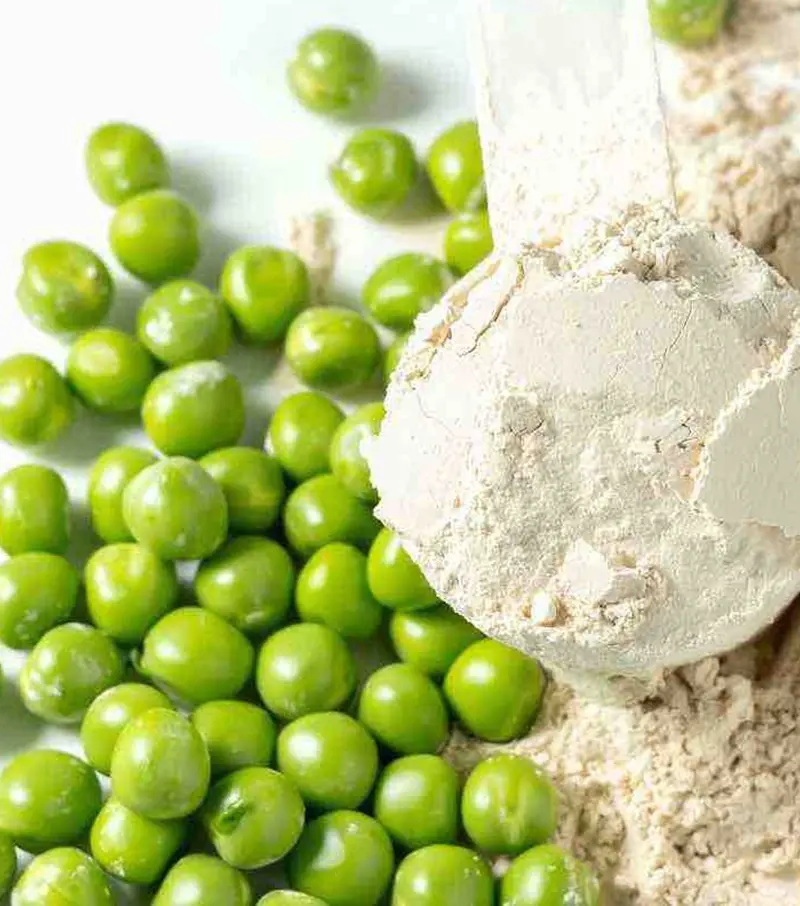
Peas are a good source of plant-based protein which is essential for building and repairing tissues. A half-cup serving of cooked peas contains about 4 grams of protein. They are relatively high in protein compared to many other vegetables. While plant-based proteins may lack some essential amino acids found in animal sources, peas protein contain a good balance of amino acids.
They are particularly rich in lysine and arginine. Protein is crucial for muscle building and repair. Including peas in your diet can contribute to meeting your protein needs for maintaining and repairing muscle tissues. Pea protein is available in various forms, including pea protein powder and protein-enriched food products. This versatility allows individuals to incorporate pea protein into a variety of dishes and snacks.
2. High In Fiber
Peas are also high in fiber which can help to promote digestive health and regularity. A half-cup serving of cooked peas contains about 4 grams of fiber. The high fiber content in peas supports a healthy digestive system by promoting regular bowel movements and preventing constipation. Fiber adds bulk to stool, aiding its passage through the digestive tract.
It contains both soluble and insoluble fiber which contribute to softening and adding bulk to stool. This helps prevent constipation and promotes regularity. Dietary fiber acts as a prebiotic, providing nourishment for beneficial gut bacteria. A healthy gut microbiota is associated with various aspects of overall health, including immune function and metabolism.
3. Low In Calories
Peas are a low-calorie yet nutrient-dense food, making them a healthy option for those looking to manage their calorie intake while still obtaining essential nutrients. They can be easily incorporated into various dishes, adding flavor, texture, and nutritional value without significantly increasing calorie content. This versatility makes them a practical choice for a range of meals.
Peas, especially when consumed in their raw or lightly cooked form, can serve as a nutritious and low-calorie snack. This is a healthier alternative to many processed snack options that may be higher in empty calories.
4. Rich In Vitamins And Minerals
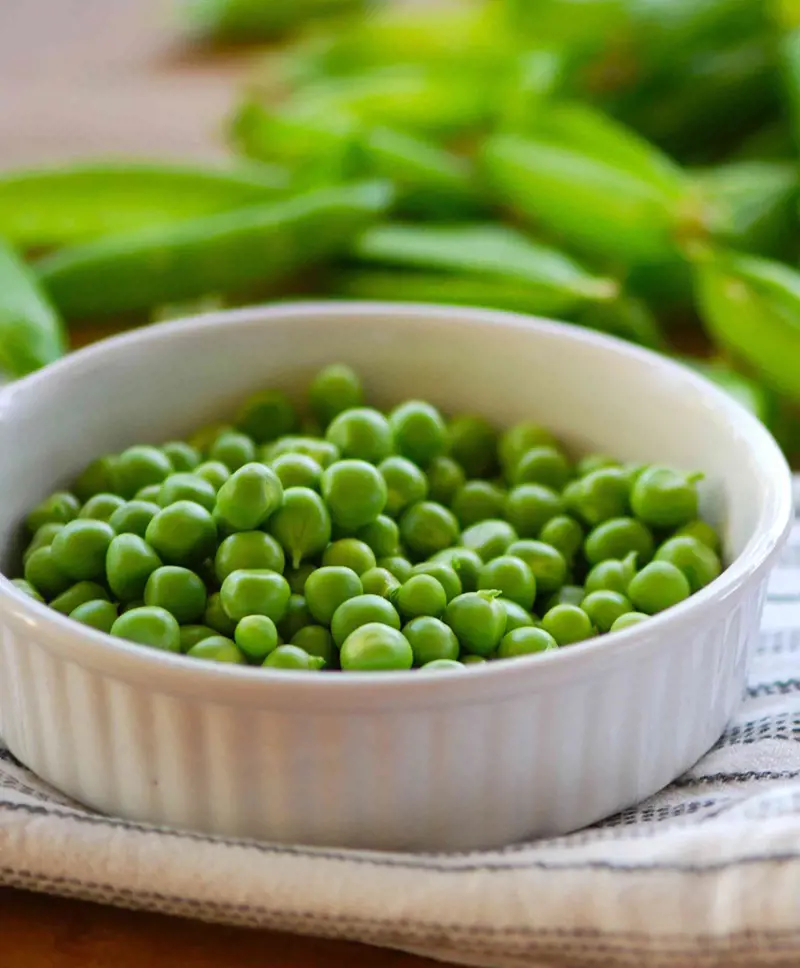
Peas are a good source of various B vitamins which play roles in energy metabolism, nerve function, and the formation of red blood cells. Folate is particularly important for fetal development during pregnancy. While the iron in peas is non-heme iron, it still contributes to overall iron intake. It is essential for the formation of hemoglobin and the transportation of oxygen in the blood.
Furthermore, they are a good source of potassium which is crucial for maintaining proper fluid balance, regulating blood pressure, and supporting muscle and nerve function. This trace mineral found in peas plays a role in the formation of red blood cells, collagen synthesis, and the maintenance of healthy connective tissues.
5. May Help To Lower Cholesterol
Peas contain various phytonutrients, including flavonoids and carotenoids, which have antioxidant properties. These antioxidants may help prevent oxidative damage to cholesterol, reducing the risk of it becoming oxidized and contributing to arterial plaque formation. The soluble fiber in peas can also help reduce the absorption of dietary cholesterol from the intestines, further contributing to lower cholesterol levels.
Not only that but it contains phytosterols, plant compounds that have a structure similar to cholesterol. Phytosterols can compete with cholesterol for absorption in the intestines, leading to reduced cholesterol absorption.
6. Eye Health

Peas contain significant amounts of lutein and zeaxanthin, carotenoids that are essential for eye health. These compounds accumulate in the retina and help protect the eyes from harmful high-energy light waves like ultraviolet rays. It contributes to reducing oxidative stress in the eyes.
Oxidative stress is associated with age-related macular degeneration (AMD) and other eye conditions. Moreover, the combination of lutein, zeaxanthin, and other nutrients in peas may help prevent age-related macular degeneration (AMD), a common cause of vision loss in older adults.
7. Immune System Boost
Peas are a good source of vitamin C and antioxidants which can help to boost the immune system and protect against illness. It offers several nutritional benefits that can contribute to a strengthened immune system. While no single food can guarantee immunity, a well-balanced diet that includes nutrient-rich foods like peas can support overall immune function.
Furthermore, it contains vitamin C, an antioxidant that plays a crucial role in supporting the immune system. Vitamin C helps stimulate the production of white blood cells which are essential for fighting off infections.
8. Weight Management
Peas have a low glycemic index, meaning they do not cause significant spikes in blood sugar levels. This helps avoid energy crashes and cravings associated with sugar fluctuations, contributing to better control over eating habits and potentially aiding weight management.
One cup of cooked peas boasts only about 85 calories and virtually no fat. This makes them an ideal low-calorie option for filling meals and snacks without exceeding your daily calorie needs.
9. Heart Health
Peas offer various nutritional benefits that contribute to heart health. Folate is associated with a reduced risk of cardiovascular disease. Peas provide folate which helps regulate homocysteine levels, a marker associated with heart health.
They are rich in potassium, a mineral crucial for regulating blood pressure. Potassium counteracts the effects of sodium which can constrict blood vessels and lead to high blood pressure. By promoting vasodilation, potassium helps maintain healthy blood pressure levels, reducing the risk of heart disease and stroke.
10. Antioxidant Power
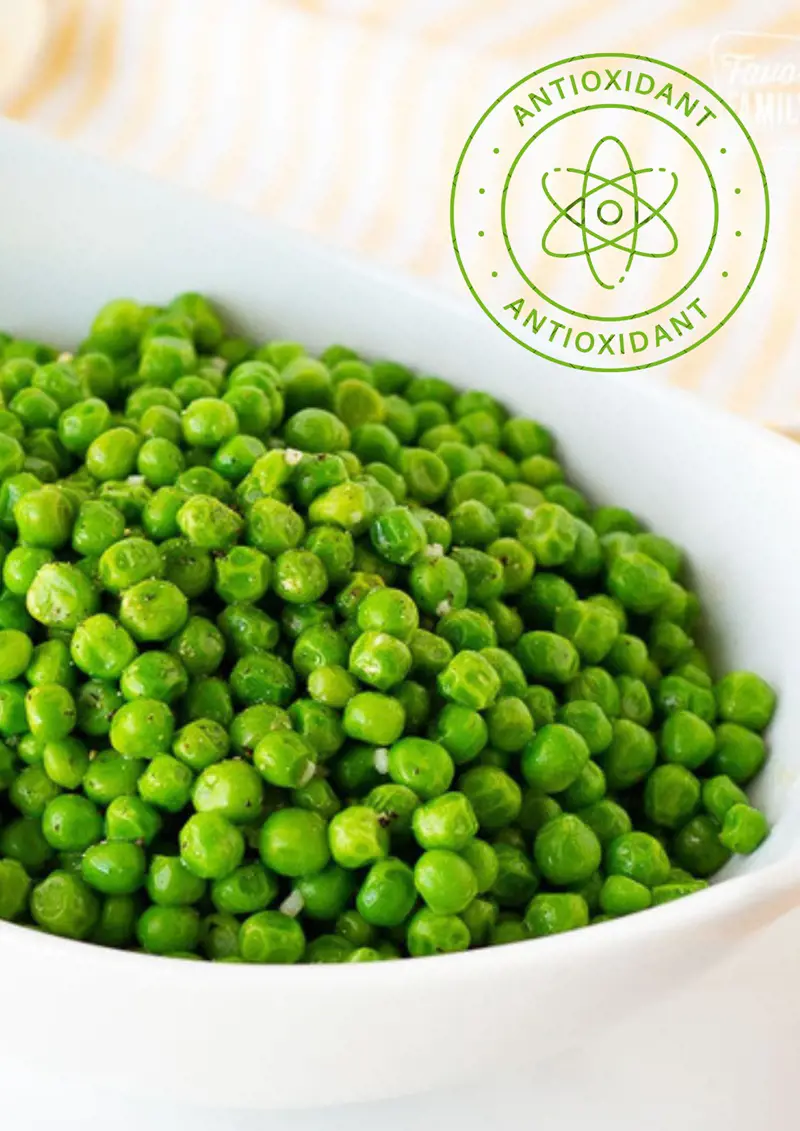
Peas are rich in various antioxidants which play a crucial role in protecting the cells from damage caused by free radicals. It contains various flavonoids, including catechin and epicatechin. Flavonoids have antioxidant properties that help neutralize free radicals, reducing oxidative stress in the body.
The combination of various antioxidants in peas creates a synergistic effect, amplifying their overall health benefits.
11. Improved Digestion

Peas are low on the glycemic index, meaning they do not cause sudden spikes in blood sugar. This helps prevent digestive discomfort and potential bloating associated with rapid blood sugar fluctuations. For some individuals with Irritable Bowel Syndrome (IBS), a diet that includes moderate amounts of peas may be well-tolerated and can provide a source of fiber without triggering symptoms.
The combination of fiber and water content in peas helps prevent constipation by promoting stool formation and regularity. This can alleviate discomfort and contribute to a smoother digestive experience.
12. Anti-Inflammatory Effects
Peas contain various flavonoids, including catechin and epicatechin. Flavonoids have antioxidant and anti-inflammatory properties, helping to neutralize free radicals and reduce inflammation in the body. Quercetin is a flavonoid found in peas known for its anti-inflammatory and antioxidant effects. It may help modulate the immune response and reduce inflammation associated with chronic conditions.
It contains carotenoids which have anti-inflammatory and antioxidant properties. These compounds may help combat inflammation and protect cells from damage. Furthermore, it contains phytosterols, plant compounds that have been associated with anti-inflammatory effects, potentially reducing inflammation in the body.
13. Skin Health
While peas themselves have a high water content, maintaining overall hydration by drinking enough water is crucial for healthy skin. Proper hydration helps keep the skin moisturized and supple.
Peas offer various nutrients that can contribute to skin health. While they might not be a direct remedy for skin issues, incorporating peas into a well-rounded diet can provide essential vitamins and antioxidants that support overall skin health.
14. Help To Reduce The Risk Of Birth Defects
Peas are a good source of folate, a crucial nutrient during pregnancy. Adequate folate intake before and during early pregnancy is associated with a reduced risk of neural tube defects (NTDs) in the developing fetus, such as spina bifida and anencephaly. It offers several nutritional benefits that can contribute to reducing the risk of birth defects, particularly due to the presence of key vitamins and minerals.
Moreover, it contains zinc, an essential mineral for fetal development. Adequate zinc intake is crucial for normal growth and development and it plays a role in DNA synthesis and cell division.
15. Bone Health
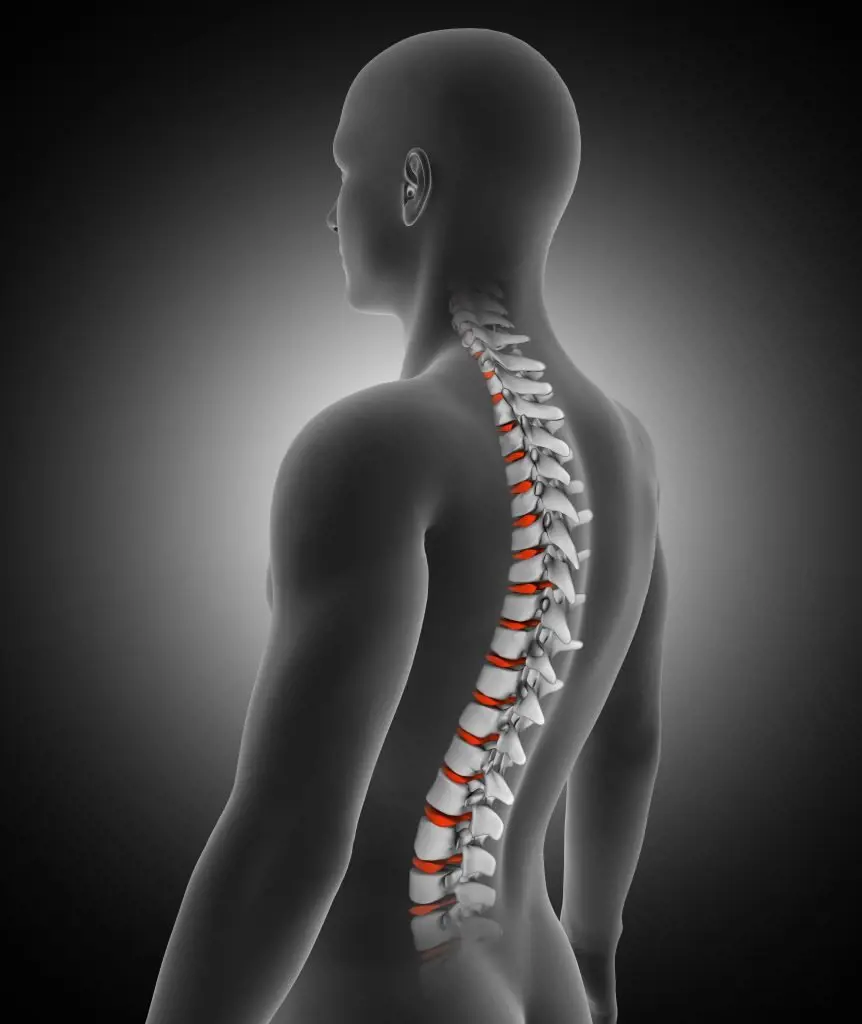
Peas provide several nutrients that contribute to bone health. While they may not be as rich in certain bone-building nutrients as dairy products or leafy greens, they still offer valuable contributions.
While not as high in calcium as some other foods, peas still contribute to calcium intake. Calcium is a key mineral for bone structure and strength. Adequate calcium intake is essential for preventing osteoporosis and maintaining bone density.
Recent posts
Nutrition
Nutrition
Hard Boiled Eggs Nutrition, Benefits And How To Eat?
Packed with vitamins, minerals, and protein, hard-boiled eggs are a nutritious powerhouse that gives your body endurance and vitality. They are adaptable, simple to make, and pair well with various types of healthy diets. Hard-boiled eggs are rich in...
Nutrition
Duck Eggs Benefits, Nutrition, And How To Eat?
Believed to have better taste and texture than chicken eggs and significantly bigger, duck eggs are nutrient-packed. They supply a very high amount of protein, omega-3 fatty acids, vitamins and minerals which makes them perfect for people who wish to...
Nutrition
Are Egg Whites Good For You? Benefits, Nutrition, And How To Eat?
Egg whites are popular these days while egg yolks are considered a health havoc. This claim is not always true but if you are someone who is going through weight gain problems or other conditions like heart disease, it's important to focus on egg whi...
Nutrition
20 Heart Healthy Foods You Must Include In Your Diet
Your heart is your body's engine that functions nonstop to maintain your vitality. It's time to give back to your heart which does so much to you. Eating heart-healthy proper food is one of the simple and effective ways to boost your heart health. Ho...
Nutrition
20 Foods You Can Eat On A Low Residue Diet
A low-residue diet is designed to minimize the amount of undigested food that moves through the intestines, making it beneficial for individuals with certain digestive issues, such as inflammatory bowel disease or before certain medical procedures. T...
Nutrition
15 Moringa Benefits That Can Make You Healthier
Known as the "miracle tree", moringa is celebrated for its remarkable health advantages. This plant’s leaves, flowers, seeds, and roots have been often used in folk medicine as they bear numerous minerals and antioxidant properties. This plant ...

